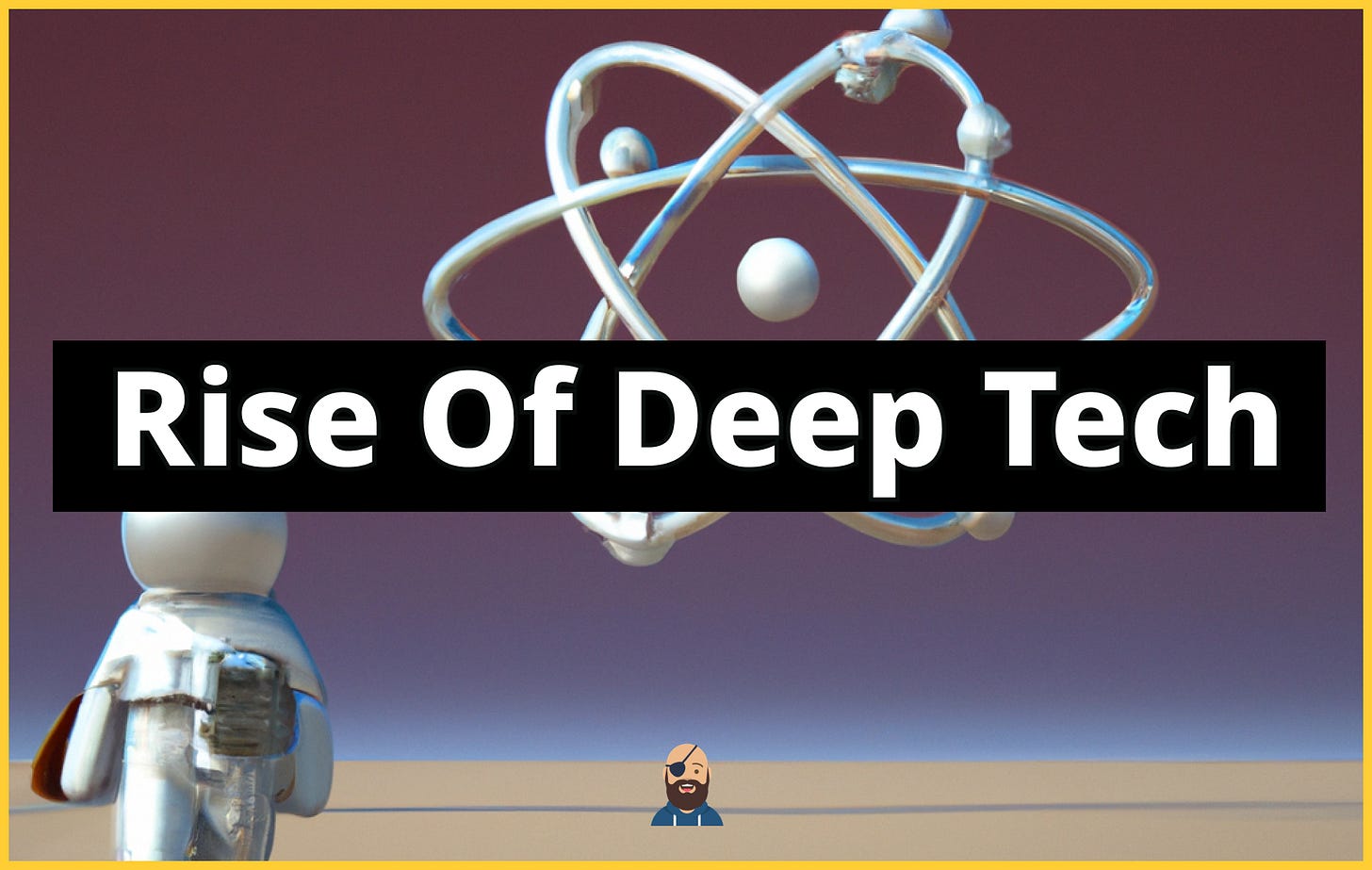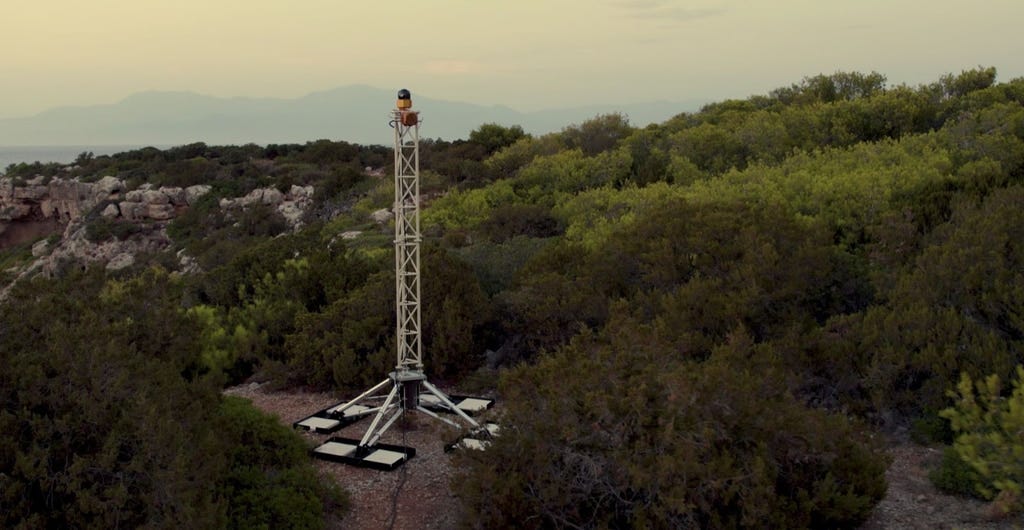The Rise Of Deep Tech
A great wave of innovation and Europe's strategic autonomy, Hack The Box Series B, cryptography, startup recruitment, jobs, events, and more
Happy New Year! May you have a great year and a wonderful time ahead. Before we get into it this week, quick reminder: Startup Pirate is about startups and technology — with a Greek twist. Subscribe below for tech trends, startup advice, news, and jobs. Join 4,344 others:
Find me on LinkedIn or Twitter,
-Alex
The Rise Of Deep Tech
In the last decades, we’ve had relentless progress in the world of bits — or information technology: computers, internet, mobile. But atoms have been somewhat stuck. When tracked against the lofty hopes of the 1950s and 1960s, technological innovation has fallen short in multiple domains: agriculture, energy, manufacturing, transportation, biomedical.
Let’s consider the most literal instance of non-acceleration: We are no longer moving faster. The travel time across the Atlantic is, for the first time since the Industrial Revolution, not getting much shorter after decommissioning Concorde in 2003. The war on cancer — President R. Nixon signed the National Cancer Act on Dec 23, 1971. A half-century later, the debate over what constitutes victory continues. W. Churchill was excited about nuclear fusion in 1932, yet fusion is always 30 years away.
Software alone can only go so far. Its eating the world requires advanced technological breakthroughs in multiple industries. Incremental, rather than disruptive, progress has permeated science too. The proportion of publications that send a field in a new direction has plummeted over the past half-century.
What happened to the future? Did we stop dreaming?
The dreaming is here, it’s just not evenly distributed.
Today, a new wave of awe-inspiring teams is pushing the frontiers of what’s possible — a new wave of moonshots. The term moonshot was derived from the Apollo 11 spaceflight project, which landed the first human on the moon in 1969. While the term originally meant long shot, it's increasingly being used to describe a monumental effort and a lofty goal — a giant leap.
Clean and sustainable energy (First Light Fusion), sustainable food production (Augmenta), cheaper and faster transportation (iCOMAT). These are just a few examples of Greek-founded deep tech companies taking on some of society's toughest challenges.
Deep tech is often referred to as technology where there’s science or engineering risk in getting the idea to work and, assuming it does, there’s also a risk in proving market demand (sometimes less so due to the clear potential value of the solution to society). Value is realised later compared to other companies.
Alas, we need more people who aim to solve an exigent problem in the world and change the course of history.
Whether it's for defending democracies (Lambda Automata), building the equivalent of public transport for satellites (SmallSpark), transferring goods on demand through the air (Matternet), developing back pain treatments (Orthoson), producing functional materials and nanocomposites (META), restoring freedom through brain–computer interfaces (Precision Neuroscience) or a plethora of other problems tackled by ambitious deep tech entrepreneurs, progress starts with fresh ideas and individual effort.
When something previously thought of as incredible becomes reality, it spurs action at the individual and collective levels, raising expectations of what’s deemed possible. New companies are built off of prior breakthroughs and widen the scope of who can create deep tech companies. From geeks to polymaths, everyone has a role in invention and innovation.
Globally, deep tech enters the phase that software did a decade ago with better infrastructure, declining costs, willing buyers, and more available capital. Causaly has raised $23m to accelerate how humans acquire knowledge and develop insights in biomedicine. Axelera AI has secured $45.7m to develop AI chips for accelerated processing. A total of $22.2m in investments for Better Origin, the AI-powered mini-farms that mitigate food waste. ZOE has raised $77m to unravel the complex relationship between food and health. DeepCure has raised $40m for its AI engine for small-molecule drug discovery — (above figures from Crunchbase).
Now that our society has managed to come together globally, it’s time to surpass the barriers of nature once again. To do so, we should divert from a more incrementalist, risk-averse approach and make people dream again. 10x, not 10%.
Many deep tech companies have their roots in academia and Europe has some of the best engineering departments in the world. In fact, European universities claim 8 of the top 20 spots. Yet, the need to rewrite the European spin-out playbook is imminent. European spin-outs are often structurally set up to fail or sell early to larger organizations instead of going the distance. Europe breeds technological assets, but not many thriving businesses.
While the VC investment in deep tech in Europe has overtaken that in China, Europe lacks the large-scale long-term strategic R&D approaches of the US (eg DARPA) and China to ensure tech leadership in frontier industries. If a region doesn’t have tech champions, most of its deep tech investments will benefit others. The market for technology is global, and large companies are scouting assets around the world. If we take a look into some of our own, local cases: Think Silicon was acquired by US Applied Materials, Helic by US Ansys, Adveos by Chinese Beken, Innoetics by South Korean Samsung.
The need to address energy, climate, food, housing, transportation becomes pressing. Meanwhile, Western governments deciding to break free from the one-sided addiction of having pretty much everything we consume produced in China, can lead to massive capital investment into the reindustrialisation of the West — a capex boom. A vibrant deep tech industry is of existential importance for the strategic autonomy of Europe in the decades to come and deep tech entrepreneurs can lead the charge. Success breeds success.
We need to dream and then we need to build. Let’s start today.
At Marathon, we invest in Greek founders pushing the frontiers of what’s possible — let’s chat!
Startup Jobs
Looking for your next career move? Check out job openings from Greek startups hiring in Greece, abroad, and remotely.
News
Hack The Box, the world's leading cybersecurity training platform raised a $55m Series B round led by Carlyle. This gave us the opportunity to return in one go the full Marathon Fund I plus more, and reinvest to participate in the company's future success.
Decent, a no-code contract builder and protocol for creators to easily construct customizable token-based projects, raised $3.5m.
Hyperlocal social network app that connects people in the same residential building, OneRoof, raised $3.2m in seed funding.
Food tech startup, BlakBear raised £2.3m seed to reduce food going to waste. The company has developed a way to measure and indicate food freshness via embedded sensors that detect the ammonia levels being produced by the food.
Space tech startup SmallSpark was backed by the UK Space Agency.
Medical innovation startup that aims to transform the diagnosis of genetic disorders, gMendel, won a €500k grant.
Publicly traded property and casualty insurance company, Chubb, launched a technology hub in Thessaloniki.
Interesting Reads & Podcasts
A podcast with Kostas Chalkias, co-founder & Chief Cryptographer of Mysten Labs, on cryptography, next-gen blockchains, Sui, and proof of reserves.
Going to market faster and developing a strong business acumen as a product person by Kostas Xiradakis, Product Manager at Viva Wallet, here.
What recruiters need to know about startup recruitment from Igor Bobryk, Recruitment Lead and People Business Partner at Hack The Box, here.
Focusing on user experience as a builder by Mike Giannakopoulos, Staff Product Manager at Hack The Box, here.
Behind the scenes of a VC fund from Panos Papadopoulos, Partner at Marathon Venture Capital, here.
A Product Manager's toolkit for creativity by Joseph Alvertis, Product Consultant at WUP Technologies, here.
Looking ahead to crypto in 2023 from Danny Sursock, Investor at Archetype (link).
Difference between project and product management from Dimitri Ntempos, Product Owner at 100mentors, here.
Generating secure randomness on Ethereum using SNARKs by Georgios Konstantopoulos, CTO at Paradigm (link).
The story of building the proptech startup Prosperty, and insights on Greek real estate with the company’s founders Antonis Markopoulos, Antonis Despotakis, and Nikos Patsiogiannis.
Events
“GCC Social Meet-up in Athens and Thessaloniki” by Greek Cryptocurrency Community on Jan 14
“User story slicing and estimation” by Zero To MVP Jam on Jan 17
“State of the Greek Venture Capital Scene” by Hellenic Innovation Network on Jan 19
“.Net v.7 - Production-Ready in 30 minutes” by Athens.NET on Jan 26
“Product-Led Hub Training Programs Kick-Off Event” by Product-Led Growth Hub on Jan 31
If you’re new to Startup Pirate, you can subscribe below.
As I plan my writing for this year, please reply in the comments below or to this email with ideas on any of the following: What did I write that you enjoyed in 2022? What did you not like? What do you want more of? Which are the founders I should interview? What other feedback do you have? I plan to do much more on the newsletter front in 2023, so hearing from you will help guide my plans. Thanks for your support!
See you in two weeks.
P.S. if you’re enjoying this newsletter, share it with some friends or drop a like by clicking the buttons below ⤵️





